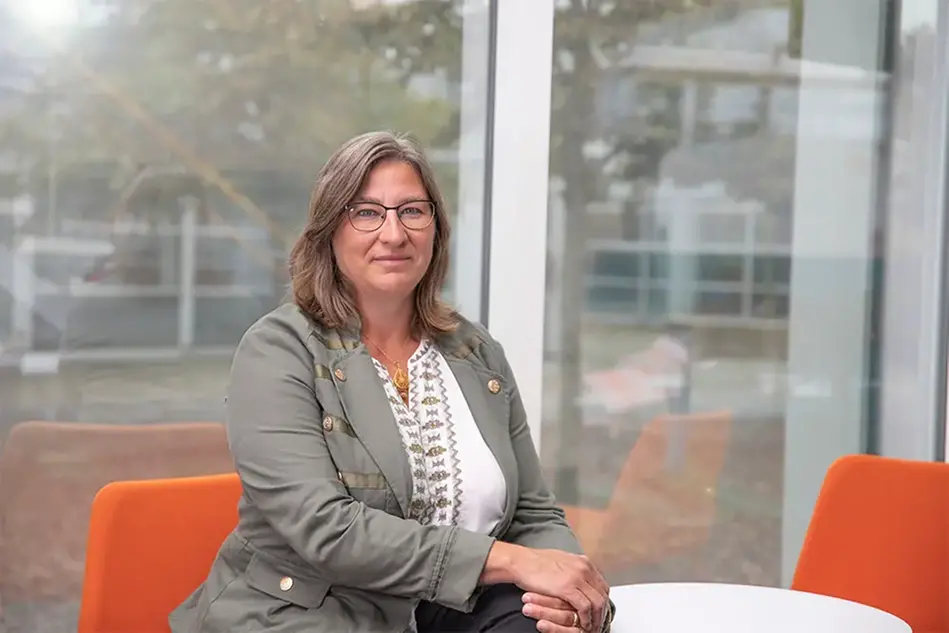Professor’s portrait: A desire to improve the world
Who should have the right to consume when the earth's resources are scarce? How is the welfare state affected by environmental issues and climate change? Human ecology encompasses interdisciplinary perspectives from both natural and social sciences. It was this fact that encouraged Pernilla Ouis to take Lund University’s first course in human ecology in the mid-nineties. She came with a Bachelor’s Degree in Natural Sciences with chemistry as the main subject, as well as a great interest in animals and environment which she had had since childhood.
“Ecological and social sustainability is about creating good living conditions for people. Becoming a professor gives me a wider platform and better opportunities to promote and speak on certain issues.”
Pernilla Ouis, Professor of Social Work
In Pernilla Ouis’s doctoral thesis “Power, Person, and Place: Tradition, Modernity, and Environment in the United Arab Emirates”, one theme is how nature is socially constructed, i.e. affected by humans. Even in areas where many of us might think that we do not have any real impact, such as nature reserves or “open landscapes”, people are the ones to make the decisions to establish these nature reserves and open landscapes and to actively work to maintain these nature types.

Pernilla Ouis is still working at Malmö University completing some projects but will start working full time at Halmstad University from the autumn 2020. In Halmstad, she has been involved in developing an educational programme in Social Work for Halmstad University, with three themes: sustainable social work, digitisation and intersectionality.
When working on her thesis, Pernilla Ouis investigated nature and modernisation in the Gulf state of the United Arab Emirates, in light of the country’s oil-based export income
Researcher with personal experience
Pernilla Ouis’s research has recurring themes such as ”Muslim in Sweden”, “a Muslim perspective on the convention on the rights of the child”, “the woman question – the Achilles heel of Islam?” and “Islamic ecotheology – a new green movement?”. This is due to a strong interest in migration and integration issues, but also her personal experience. In her youth she converted to Islam and lived as a Muslim for over two decades.
For sustainable social development
In Malmö, Pernilla Ouis has led the work at the Institute for Urban Sustainable Development, a collaborative platform aimed at developing Malmö into a leading city in the field of sustainable urban development: ecologically, economically, socially, and culturally.
Pernilla Ouis is not deterred by sensitive fields of research. Together with the Swedish Civil Contingencies Agency, she studies the Muslim civil society in Sweden, including potential factors which may drive radicalisation.
“There are Muslim authorities and Islamic interpretations which limit integration. This in turn has a negative effect on equality and democracy. As part of this project, I have interviewed people who have left radical Islamism behind.”
During 2019, Pernilla Ouis is compiling an anthology on sexuality and migration.
Being relevant and doing good
Pernilla Ouis has helped design the social work programme at Halmstad University. Three themes are to permeate the programme: sustainable social work, digitalisation, and intersectionality.
“I think that the Social Work staff group has designed a very interesting programme, which is contemporary, relevant, and innovative. We will offer courses where the subject matter is in demand, such as migration and family conflicts.”
As a professor, Pernilla Ouis has the same drive as always. In her own words, she has always had some sort of eagerness to help improve the world.
Text: Anna Vörös
Translation: Semantix
Photo: Dan Bergmark
About Pernilla Ouis
Pernilla Ouis was born in 1965 in Gothenburg. Her research profile is interdisciplinary. She completed a Bachelor’s Degree in Natural Sciences with chemistry as the main subject at Lund University in 1996. In 2002 she defended her thesis in Human Ecology thesis “Power, Person, and Place: Tradition, Modernity, and Environment in the United Arab Emirates” at Lund University. In 2011, she became an Associate Professor of Health and Society, in the field of ethnic relations at Malmö University. During 2016–2017 she was the deputy head of the Centre for Sexology and Sexuality Studies at Malmö University, and in 2018 she became the operations manager at the Institute for Urban Sustainable Development in Malmö. In 2019 she was appointed Professor of Social Work at Halmstad University.

